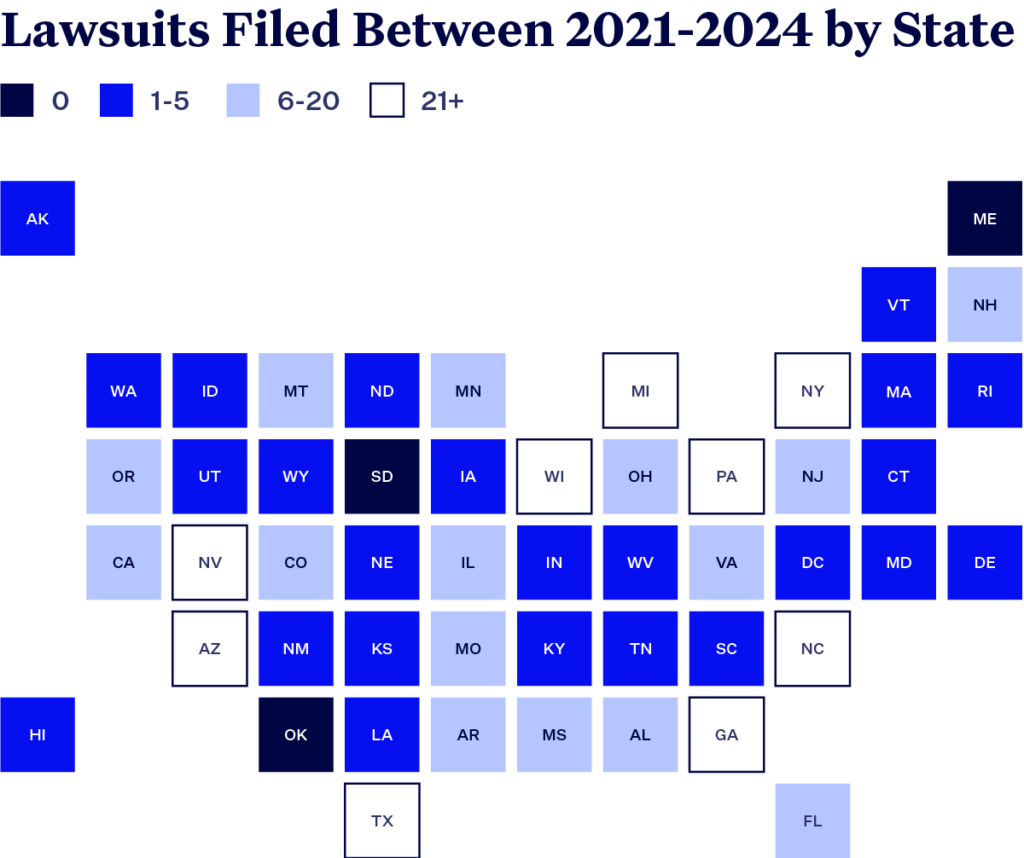Following Donald Trump’s defeat in 2020, we witnessed an explosion of voting and election-related litigation. Sparked by a wave of voter suppression laws and Republican efforts to justify the “Big Lie,” nearly 600 lawsuits were filed over the next four years — reaching almost every state in the country.
Leading up to the 2024 election, we anxiously followed the twists and turns as laws, rules, regulations and interpretations were litigated in court. Barely a day passed without a significant court decision about who could vote, how votes would be counted, and whether they would be accurately certified.
The impression was that both sides were leaving no stone unturned — pro-democracy organizations fighting tooth and nail to enfranchise every eligible voter, while the GOP and its allies worked equally hard to disqualify voters and discard ballots wherever they could.
Yet beneath the headlines and lawsuit tallies lies a more uneven picture of democracy in the courts. While voting rules in battleground states were aggressively litigated, far fewer lawsuits were filed in the vast majority of the country.
Pennsylvania alone was the subject of 88 voting-related lawsuits — more than the bottom 29 states combined. In fact, the top nine battleground states accounted for nearly two-thirds of all voting litigation nationwide. While each of those nine states saw more than 20 lawsuits, seven states saw only one case, and three saw none at all during the same period.

This is not to suggest there weren’t serious issues to address in Arizona, Pennsylvania and other swing states. But it would be wrong to conclude that their voting laws were more suppressive or subject to bad-faith interpretation than those in states that saw little or no litigation.
Take, for example, the issue of ballot drop boxes — one of the most hotly contested voting practices in recent years. In July 2023, progressive organizations sued to overturn Wisconsin’s ban on ballot drop boxes. Yet just four months earlier, South Dakota enacted a similar ban that went entirely unchallenged.
That wasn’t the only way South Dakota made voting more difficult. Like several other Republican-controlled states, it expanded the role of partisan poll watchers and prohibited the distribution of mail-in ballot applications with pre-filled information — exactly the kinds of provisions challenged in more politically competitive states.
Similarly, while dozens of lawsuits were filed challenging nearly every aspect of mail-in voting in Georgia and Pennsylvania, not a single lawsuit was brought against Indiana’s restrictive mail-in voting law enacted in 2023. In fact, Indiana saw only one voting lawsuit over the entire four-year period. South Dakota saw none.
The danger in ignoring the voting rights of citizens in more than half the country is that it creates a two-tiered democracy. Voters in swing states benefit from rigorous legal protections, while voters elsewhere are left to navigate increasingly burdensome rules without meaningful support or scrutiny.
This also reinforces a feedback loop: states with restrictive voting laws receive little attention because they aren’t electorally competitive. But part of the reason they aren’t competitive is because their laws prevent large segments of the population from voting.
Addressing this problem has never been more urgent or more important. Our democracy is facing an existential crisis. Donald Trump is actively dismantling democratic institutions and undermining the rule of law. Only through free and fair elections can we hope to restore our republic.
But that requires free and fair elections in every state, not just in a strategic few.
Given the GOP’s built-in advantage in the Senate, Democrats will need fair voting rules not only in traditional battlegrounds like Michigan, North Carolina and Georgia, but also in states like Alaska, Iowa and Kentucky. Control of the House, which remains nearly evenly divided, will depend on close elections in districts across as many as 30 states.
None of this will be easy, even in the best of times. And it is even harder now, as Trump’s attacks on voting rights continue and the Republican Party embraces voter suppression as a national strategy.
But those of us in the pro-democracy movement cannot back down. We must confront this challenge head-on.
That means conducting a nationwide review of voting barriers in all 50 states. It means dedicating resources to challenge laws that disenfranchise voters. And it means having the political will to fight for the right to vote everywhere, regardless of how competitive a state appears today.
Republicans are counting on us to ignore what’s happening in the states they control. They are banking on us not having the resources or the will to fight for voting rights in states where recent history suggests the election results will not be close. They want us to be resigned and demoralized while their voter suppression machine grinds on.
For the sake of our democracy, we must prove them wrong.
